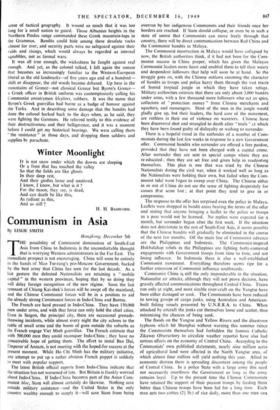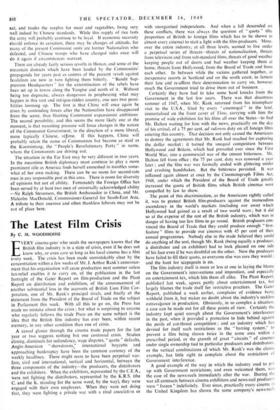Communism in Asia
By LESLIE SMITH
Hongkong, December 5th
THE possibility of Communist domination of South-East Asia from China to Indonesia is the uncomfortable thought that is worrying Western administrators in the Far East. The immediate prospect is not encouraging. China will soon be entirely in the hands of Mao Tse-tung's pro-Moscow Government, backed by the best army that China has seen for the last decade. As a last gesture the defeated Nationalists are retaining a " mobile capital " in the western provinces, hoping that by so doing they will delay foreign recognition of the new regime. Soon the last remnant of Chiang Kai-shek's forces will be swept off the mainland, and the Chinese Communist forces will be in a position to aid the already strong Communist forces in Indo-China and Burma.
The French are hard pressed in Indo-China. They have 150.000 men under arms, and with that force can only hold the chief cities. Even in Saigon, the principal city, there are occasional grenade- throwing incidents, while almost every night the city echoes to the rattle of small arms and the boom of guns outside the suburbs as the French engage Viet Minh guerrillas. The French estimate that with 500,000 men they could reconquer Indo-China ; they have no onceivable hope of getting them. The effort to instal Bao Dai, Emperor of Annam, is not meeting with the hoped-for success at the present moment. While Ho Chi Minh has the military initiative, any attempt to put up a rather obvious French puppet is unlikely to meet with popular support.
The latest British official reports from Indo-China indicate that the situation has not worsened of late. But Britain is frankly worried about Indo-China. If Indo-China becomes part of the Asian Com- munist bloc, Siam will almost certainly do likewise. Nothing save outside military assistance—and the United States is the only country wealthy enough to supply it—will save Siam from being
overrun by her indigenous Communists and their friends once her borders are reached. If Siam should collapse, or even be in such a state of unrest that Communists can move freely through that country, there will be direct communication between Red China and the Communist bandits in Malaya.
The Communist insurrection in Malaya would have collapsed by now, the British authorities think, if it had not been for the Com- munist success in China proper, which has given the Malayan Communist leaders more heart and enabled them to tell their weary and despondent followers that help will soon be at hand. Sr the struggle goes on, with the Chinese outlaws assuming the character of bandits as troops and police harry them through the vast tracts of humid tropical jungle in which they have taken refuge. Military authorities estimate that there are only about 3,0(X) bandits under arms, with a few thousand more followers who act as spies, collectors of " protection money " from Chinese merchants and squatters, and messengers. Most of the men in the jungle would gladly give up, but their leaders, the hard core of the movement, are ruthless in their use of violence on waverers. Chinese have been discovered shot and strangled to death after " trials " t.t which they have been found guilty of disloyalty or wishing to surrender.
There is a hopeful trend in the surrender of a number of Com- munists during the last fcw weeks in response to a new Government offer. Communist bandits who surrender are offered a free pardon, provided that they have not been charged with a capital crime. After surrender they are sent to special camps where they are re-educated ; then they arc set free and given help in readjusting themselves. This plan is one that was tried by the Chinese Nationalists during the civil war, when it worked well so long as the Nationalists were holding their own, but failed when the Com- munist tidal wave began to sweep over China. The Chinese either in or out of China do not see the sense of fighting desperately for causes that seem lost ; at that point they tend to give in or compromise.
The response to the offer has surprised even the police in Malaya. Leaflets were dropped in bandit areas bearing the terms of the offer and stating that anyone bringing a leaflet to the police or troops as a pass would not be harmed. No replies were expected for a month, but surrender began after the first week. If the situation does not deteriorate in the rest of South-East Asia, it seems possible that the Chinese bandits will gradually be eliminated in the course of the next few months. Off the main line of Communist advance arc the Philippines and Indonesia. The Communist-inspired Hukbalahap rebels in the Philippines are fighting hotly-contested engagements with Government troops from time to time, and not losing influence. In Indonesia there is also a well-established Communist movement. Everything therefore seems ripe for a further extension of Communist influence southwards.
Communist China iS still the only imponderable in the situation. Nationalist air attacks, although they will not prove decisive, have gravely affected communications throughout Central China. Trains run only at night, and most sizable river-craft on the Yangtsc have been either damaged or sunk. The Communists have been reduced to towing groups of cargo junks, using Australian and American- built fishing vessels presented by U.N.R.R.A. to China. When attacked by aircraft the junks cut themselves loose and scatter, thus minimising the chances of being sunk.
The floods on the Yangtse and Yellow Rivers and the disastrous typhoon which hit Shanghai without warning this summer (since the Communists themselves had forbidden the famous Catholic Zikawei Obscravtory to circulate weather reports) have also had serious effects on the economy of Central China. According to the Communists' own published statements, nearly nine million acres of agricultural land were affected in the North Yangtse area, of which almost four million will yield nothing this year. Allied to economic distress there is spreading discontent among the people of Central China. In a police State with a large army this need not necessarily overthrow the Government so long as the army remains loyal. Up to the present time the Chinese Communists have retained the support of their peasant troops by feeding them better than Chinese troops have been fed for a long time. Each man gets two catties (2f lb.) of rice daily, more than one man can
eat, and trades the surplus for meat and vegetables, living very well indeed by Chinese standards. While this supply of rice lasts the army will probably continue to be loyal. If economic necessity should enforce its cessation, there may be changes of attitude, for many of the present Communist units are former Nationalists who defected, and Chinese troops who have changed sides once will do it again if circumstances warrant.
There are already fairly serious revolts in Honan, and some of the mountain districts which have been lauded by the Communists' propaganda for years past as centres of the peasant revolt against feudalism are now in turn fighting them bitterly. " Bandit Sup- pression Headquarters " for the extermination of the rebels have been set up in towns along the Yangtse and north of it. Without being too dogmatic, always dangerous in prophesying what may happen in this vast and intrigue-ridden country, one sees two possi- bilities looming up. The first is that China will once again be riven by contending forces after the Nationalists have disappeared from the scene, thus blunting Communist expansionist ambitions The second possibility, and this seems the more likely one at the moment, is that mounting pressure will force changes in the nature of the Communist Government, in the direction of a more liberal, more typically Chinese, regime. If this happens, China will probably retain the name of Communism but become as staid as the Kuomintang, the " People's Revolutionary Party " in name, whom the Communists are driving out.
The situation in the Far East may be very different in two years. In the meantime British diplomacy must continue to play a more prominent role as America finds herself enmeshed in troubles some- what of her own making. There can be no room for second-rate men in any responsible post in this area. There is room for diversity of opinions but not of ability. Fortunately the Foreign Office has been served by at least two men of universally acknowledged ability —Sir Ralph Stevenson, the British Ambassador in China, and Mr. Malcolm MacDonald, Commissioner-General for South-East Asia. A tribute to their onerous and often thankless labours may not be out of place here.



































 Previous page
Previous page